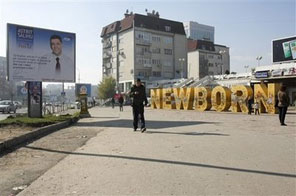Kosovo voters take to polls
PRISTINA: Kosovo's prime minister urged minority Serbs not to boycott the country's first elections since independence from Serbia, calling the Sunday vote a key test for his new nation.
Some ethnic Serbs appeared to be heeding his call and participating in an election that saw no major unrest or allegations of fraud by mid-afternoon.
Tensions between rival ethnic Albanian parties, fears of fraud and a likely boycott from the Serb minority have marred the run-up to the elections for city council and mayors in 36 municipalities across Kosovo.
The vote is the first that is being fully controlled by Kosovo's authorities and is seen as way of proving Kosovo's viability as a state following its contested declaration of independence from Serbia.
Previous elections were run by the United Nations, which took control of Kosovo from Serbia in 1999 after NATO waged an air war against Yugoslavia to stop Serb forces' brutal crackdown on ethnic Albanian separatists.
So far, 63 countries have recognized Kosovo as a state — including the United States and most countries in the European Union. Serbia has vowed to block further recognition and has Russia's support.
More than 5,000 officers were on duty. The run-up to the vote saw stones being thrown at Prime Minister Hashim Thaci's convoy and an apparent assassination attempt on an opposition mayoral candidate.
Prime Minister Hashim Thaci called it a "historical day for the sovereign state of Kosovo."
"It's great step for Kosovo," Thaci told The Associated Press after voting in downtown Pristina in the company of his wife and 10-year old son.
"I'm sure we will have success and appreciate very much participation of all citizen, in particular Serbs of Kosovo," he said.
Election authorities said voter turnout by midday was slightly over 15 percent, but gave no ethnic breakdown. Some Serb voters could be seen casting ballots in areas surrounded by majority Albanians.
Senior officials from Serbia have called on Kosovo's Serbs not to vote and the call was reinforced by the influential Serb Orthodox Church which also runs the churches inside Kosovo.
Momcilo Trajkovic, a Serb leader and mayoral candidate in the Serb enclave of Caglavica, just outside the capital Pristina, cast his ballot saying the act was a sign of better times for the dwindling minority that has seen its population decrease by a third since the end of the war in 1999, most of them searching a better life in Serbia.
Some 100,000 Serbs are estimated to now live in Kosovo, mostly in enclaves.
"This vote here shows that ... the fear ... is loosening its grip," he said, referring to pressure from other Serbs not to vote.
Some 1.5 million registered voters can cast their ballots in local government elections at over 2,000 polling stations. Preliminary results are expected within hours after polls close at 7:00 p.m. (1800 GMT, 1 p.m. EST).
"This is the best of democracy and I will do my duty as a citizen," said Zoje Bujupi, an ethnic Albanian. "I will vote for the good of our state, for the good of all of us."
Serbia's Foreign Minister Vuk Jeremic said on Sunday Serbia does not recognize elections organized by "the so-called Republic of Kosovo," but will not "retaliate" against the Serbs who take part.
"Kosovo is an integral part of Serbia, and it will always be so," Jeremic said.
In Kosovo's Serb-dominated north some branded the Serb participation in the vote just short of treachery.
"Serbs voting in these elections, that is a catastrophe," said 53-year old Zarko Rakocevic. "They are worse than the Albanians."






